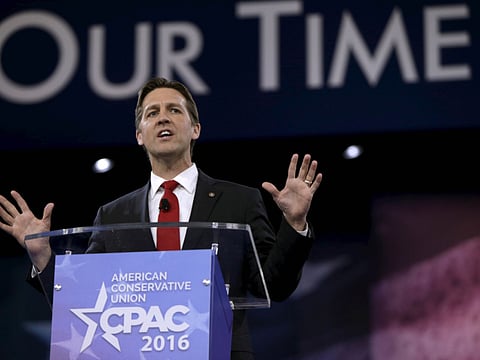Sasse could be top pick, Romney the backup
Either will demonstrate that Trump is not the face of conservative movement and a third choice beyond the Democrat and Republican nominees is possible

Reports suggesting that the search for a third presidential candidate in the United States has stalled, lacks money or faces insurmountable hurdles to qualifying for ballots in 50 states are inaccurate. Bill Kristol, editor of Weekly Standard and one of several Republicans driving the search, recently told this column: “Our research and groundwork show an independent bid is doable. I think someone credible will seize the moment within the next couple of weeks.” And yet, the problem of finding an actual candidate has dogged the group.
There is no doubt that Senator Ben Sasse (Republican from Nebraska) is a favourite among the third-candidate advocates. At the American Enterprise Institute, Sasse, in remarks prepared for delivery last Monday night, told the conservative think-tankers: “Both parties are only interested in punching each other in the face. I think we face a crisis of political vision that flows from the fact that we have two exhausted parties in Washington right now. Democrats pretend like we can make America Europe again by expanding 1960s entitlement programmes, and too many Republicans believe that we can solve the problem by making America 1950 again.” That sure sounds like a man ready to challenge both parties. He continued: “When you talk to 18-to-22-year-old kids, they’re pretty dispirited. They know that Republicans have largely left the field and Democrats have a terrible product. My party isn’t selling an optimistic vision and the other party is trying to sell centralisation in the age of Uber.”
So is Sasse the candidate? His pluses are obvious: At 44 years old, he is more than 20 years younger than both major-party candidates; he’s not a life-long politician, although he has worked in the executive branch, on the Hill, in private industry and as a university president. (He also has a PhD from Yale.) He’s articulate, upbeat and engaging. But he also has a bright future in the GOP (or whatever follows it) and young children. He’ll have 20 years or so to run for president. From the perspective of the country and the conservative movement, he would be providing a great service; from his own vantage point and his family’s, it would be a gamble and a sacrifice.
If Sasse does not run (and I’d put the odds at 50-50), there remains a backup, Mitt Romney. He has run before, has a donor network and has virtually 100 per cent name ID. He has an impressive record of private charity and public service. He is widely credited with being right on a number of issues in the 2012 campaign, including Russia. However, Republicans know all too well his limitations as a candidate. A campaign run to please the right wing of his party and that focuses on business owners (instead of employees) will have little chance of success. His pitch will need to be centrist, more akin to Governor Romney of Massachusetts than the versions we saw in 2008 and 2012. That may not thrill many conservatives. For an agenda, Romney may adopt his former running mate Paul Ryan’s reform-minded agenda, due out by convention time. Romney will need to eschew consultants, run as his own man, offer interviews to virtually anyone and offer his opponents the chance to debate anytime, anywhere.
Romney, of course, will be doing this as a final chapter in his public service. He may even pledge to serve only one term and to find Democrats to put in prominent positions. He already has been a dogged campaigner for Senate and House candidates and will give many GOP down-ticket candidates a lift. With Romney, however, the conservatives will lack a new face, a candidate responsive to the national angst and an outsider. The party will be grateful to have him, but with Romney, the third-candidate effort will take on a nostalgic, symbolic tone.
Both Sasse and Romney are long shots, certainly. That said, with Trump at the top of the ticket, the GOP is doomed to lose the White House and likely the Senate. At the very least, either of these candidates will demonstrate that Trump is not the face of the conservative movement. With Sasse, conservatives will enjoy a break with the past and will have someone strongly critical of both parties. While either Sasse or Romney will give conservatives and centrists an opportunity to vote for someone who is capable of doing the job and is personally admirable, Sasse will give them someone who can generate real excitement, an actual competitor for votes of the disaffected. That will be a welcome, surprising turn of events.
— Washington Post
Jennifer Rubin writes the Right Turn blog for the Post, offering reported opinion from a conservative perspective.


